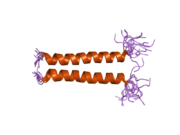T-cell surface glycoprotein CD3 zeta chain
(Redirected from
CD3 zeta
)Ensembl | |||||||||
|---|---|---|---|---|---|---|---|---|---|
| UniProt | |||||||||
| RefSeq (mRNA) | |||||||||
| RefSeq (protein) |
| ||||||||
| Location (UCSC) | Chr 1: 167.43 – 167.52 Mb | Chr 1: 165.62 – 165.7 Mb | |||||||
| PubMed search | [3] | [4] | |||||||
| View/Edit Human | View/Edit Mouse |
T-cell surface glycoprotein CD3 zeta chain also known as T-cell receptor T3 zeta chain or CD247 (Cluster of Differentiation 247) is a protein that in humans is encoded by the CD247 gene.[5]
Some older literature mention a similar protein called "CD3 eta" in
mice. It is now understood to be an isoform differing in the last exon.[6]
Genomics
The gene is located on the long arm of chromosome 1 at location 1q22-q25 on the Crick (negative) strand. The encoded protein is 164 amino acids long with a predicted weight of 18.696 kiloDaltons.
Function
T-cell receptor zeta (ζ), together with T-cell receptor alpha/beta and gamma/delta heterodimers and CD3-gamma, -delta, and -epsilon, forms the T-cell receptor-CD3 complex. The zeta chain plays an important role in coupling antigen recognition to several intracellular signal-transduction pathways. Low expression of the antigen results in impaired immune response. Two alternatively spliced transcript variants encoding distinct isoforms have been found for this gene.[7]
Interactions
CD247 has been shown to
Protein unc-119 homolog.[9]
See also
References
- ^ a b c GRCh38: Ensembl release 89: ENSG00000198821 – Ensembl, May 2017
- ^ a b c GRCm38: Ensembl release 89: ENSMUSG00000005763 – Ensembl, May 2017
- ^ "Human PubMed Reference:". National Center for Biotechnology Information, U.S. National Library of Medicine.
- ^ "Mouse PubMed Reference:". National Center for Biotechnology Information, U.S. National Library of Medicine.
- PMID 2974162.
- PMID 1828894.
- ^ "Entrez Gene: CD247 CD247 molecule".
- PMID 11349123.
- PMID 14757743.
Further reading
- Geyer M, Fackler OT, Peterlin BM (2001). "Structure--function relationships in HIV-1 Nef". EMBO Rep. 2 (7): 580–5. PMID 11463741.
- Greenway AL, Holloway G, McPhee DA, Ellis P, Cornall A, Lidman M (2004). "HIV-1 Nef control of cell signalling molecules: multiple strategies to promote virus replication". J. Biosci. 28 (3): 323–35. S2CID 33749514.
- Stove V, Verhasselt B (2006). "Modelling thymic HIV-1 Nef effects". Curr. HIV Res. 4 (1): 57–64. PMID 16454711.
External links
- CD247+protein,+human at the U.S. National Library of Medicine Medical Subject Headings (MeSH)
- Human CD247 genome location and CD247 gene details page in the UCSC Genome Browser.
- Overview of all the structural information available in the PDB for UniProt: P20963 (Human T-cell surface glycoprotein CD3 zeta chain (CD247)) at the PDBe-KB.

